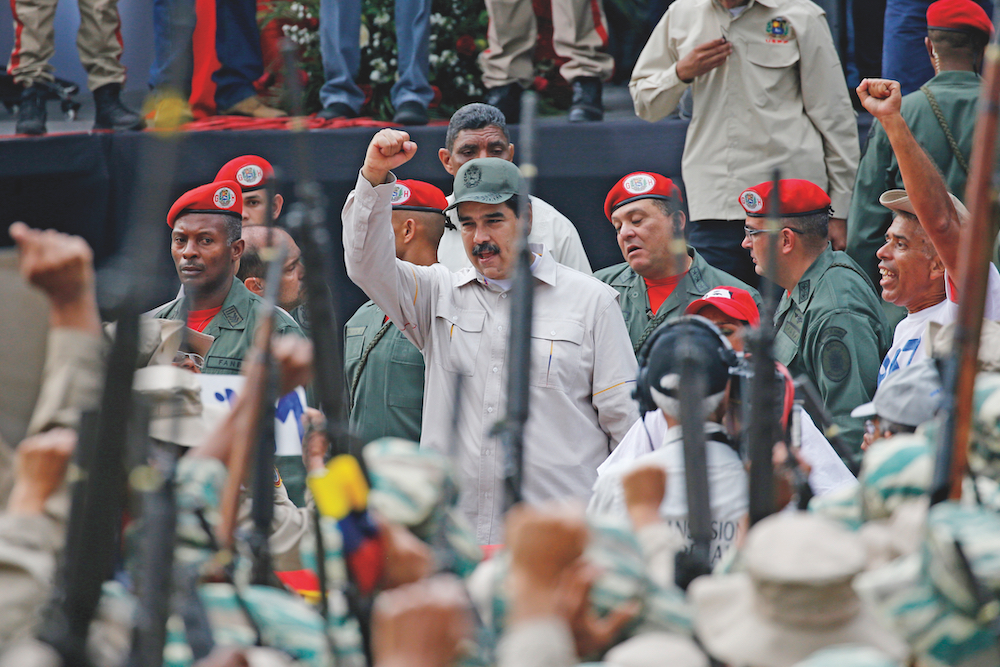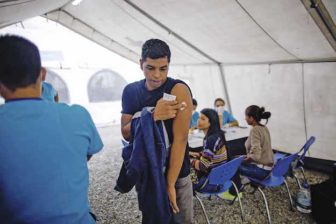This article is adapted from AQ’s special report on Latin America’s armed forces.
Chavismo imposed deep changes to many areas of the Venezuelan government, but the transformation in the armed forces — and more broadly in civil-military relations — stands out as a particularly extreme case. The basis of this shift was the blurring of lines between security and defense institutions under the “Bolivarian Revolution.” During the governments of Hugo Chávez and Nicolás Maduro, the military turned away from protecting the state and its citizens and toward defending the chavista regime.
In theory, defense institutions deal with preserving the territorial integrity of the state “from the borders out,” while security agencies protect individuals and their property “from the borders in.” This distinction is important for defense and security institutions’ ability to fulfill their missions and cooperate with peers across borders.
The defense-security distinction was clear in Venezuela for a long time. The armed forces were a professional institution made up of four branches, three of which were similar to the U.S. army, air force and navy. The fourth branch, the National Guard, was a gendarmerie force charged with working at the intersection of defense and security, taking on roles such as border patrol and protection of state-owned land.
Chavismo completely altered these divisions. The armed forces now work from the borders in, and what security institutions remain either provide protection to the regime or are dramatically underfunded. In 2009, Chávez combined these four branches into a centralized command and created an additional command made up of two new forces, the National Reserve and the Territorial Guard. This second group, the Comando General de Milicia Nacional, is under the Ministry of Defense, but works primarily with security. In addition to these forces, the Venezuelan Ministry of Defense also includes various enterprises in unrelated areas, such as agriculture, banking, and insurance, which are not normally associated with defense.
Meanwhile, members of the armed forces began occupying key civilian posts — for instance, the current president of state oil company PDVSA is General Manuel Quevedo. Last year, one in four cabinet positions was held by a member of the military.
Suppressing politics and crime
Security in Venezuela used to be mainly an attribution of municipalities and states. Chávez, however, created the Bolivarian National Police (PNB) and centralized some of this role. Although operating nationwide and reporting to the Interior Ministry, the PNB’s functions parallel those of the existing local police. Municipalities and states maintain their own forces, but these agencies are usually underfunded — particularly if the opposition oversees the local government, since funds are controlled by Caracas.
This new reality of the security apparatus has had two consequences for Venezuelans in their daily lives: political repression and a crime epidemic.
Security and defense agencies — especially the National Guard, the National Police and the militias — have been used to suppress anti-government protests. The National Police is also tasked with maintaining “full compliance with judicial order.” In practice this means that the Bolivarian Police Force is also actively involved in repression. The Special Actions Force, created by Maduro in 2017, is specifically charged with combating “crime and terrorism” — in other words, any actions interpreted as an attempt to destabilize the regime.
A UN Human Rights Council report found that in 2018 over 5,000 people died at the hands of security forces in Venezuela. Between January and May 2019, another 1,569 were killed. At the same time, despite an expanded security sector, crime rates in Venezuela have increased. Caracas was the third-most dangerous city in the world in 2018, according to Mexico’s Citizens Council for Public Safety and Criminal Justice. Some argue that a high crime environment is convenient for the regime as it reduces incentives to express discontent in the streets — or even to physically congregate outside.
Looking ahead to a transition
The new reality of civil-military relations in Venezuela also directly impacts the likelihood of a political transition and it will remain a critical topic in any post-Maduro scenario. Chávez changed the role of the military in the country, moving them closer to economic and political power. This arrangement, combined with a coup-proofed structure that creates distrust, makes it hard for any possible discontent within the armed forces to translate into a change of allegiance.
In the event of a transition, a new government would face the immediate challenge of securing recently acquired Russian weapons, including at least 5,000 surface-to-air man-portable air-defense missiles. A democratic government would also need foreign assistance in reforming its security sector, which would again be challenging for the U.S. given current relations with Venezuela. There hasn’t been a U.S. ambassador to Caracas since Patrick Duddy finished his assignment nine years ago. The last of the U.S. defense attaches were expelled in 2014. Rebuilding the once-close defense relations between the two countries will take time.
Reorganizing Venezuela’s defense and security institutions will take time as well. A new government will face several overlapping challenges — including restoring security to allow for reconstruction, deciding how to handle current active duty military and rethinking what kind of armed forces Venezuela should have.
The first — and most important — step will be to reorient the forces back to their traditional missions and reestablish the distinction between security and defense. Without putting the protection of the state and its citizens first, Venezuela will not be able to assist its people and invest in its future.
—
Perera is an assistant professor at the William J. Perry Center for Hemispheric Defense Studies at the National Defense University
The views expressed in this article are the author’s own and do not necessarily reflect the views of the William J. Perry Center for Hemispheric Defense Studies, National Defense University nor the Department of Defense.







